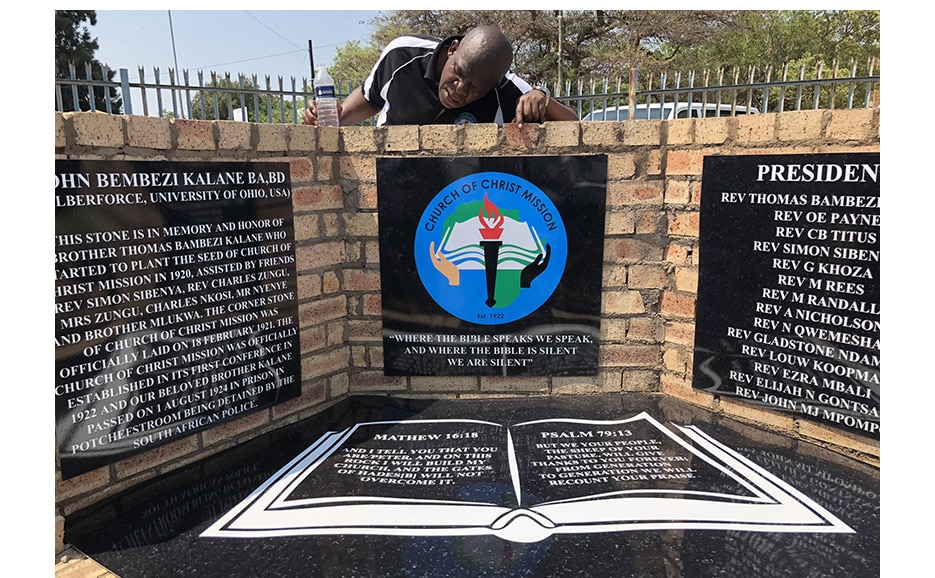
By Laura McKillip Wood
South African Church of Christ Mission celebrated its centennial with a huge gala this year. Christians remembered those who began the work and honored their leaders from the past century.
Michael and Caryl Stanley, missionaries whose family has worked in South Africa for 70 years, celebrated a full half-century of service and officially retired from the work. Michael’s brother, Duane Stanley of Minnesota, the U.S. forwarding agent, traveled to South Africa for the celebration and spoke on behalf of the missionaries. Duane answered these questions about the mission’s history.
CHRISTIAN STANDARD: How did South African Church of Christ Mission get started?
DUANE STANLEY: Thomas B. Kalane, originally from Mozambique, came to the U.S. to further his education. He was sent back to South Africa at the end of 1919 by the independent churches. Kalane began working with a small nucleus of believers, including Simon Sibenya, a student preparing for ministry. Kalane’s early converts formed the beginning of a church in Kimberley that soon branched out. In 1923 there were about 23 “churches” or circuits, with various preaching points. Kalane died in 1924.
Sibenya became the key African leader until his death in 1941. He was a deeply spiritual man, well-educated for his time, and totally committed to the work of the Lord. He worked closely with the missionaries for a decade and was the driving force in keeping the Restoration Movement alive among the Black churches for another decade while missionary recruits were stymied in their applications for visas to enter the country.
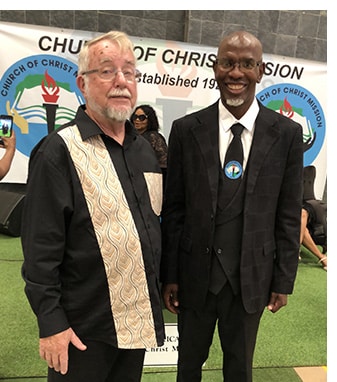
The apartheid government of South Africa required that any organization accepting funds from sources outside the country be overseen by White supervisors.
With the government requirement of White supervision, two missionaries were recruited and sent in succession during the 1920s: O.E. Payne and Charles B. Titus. Titus was convinced the needed number of missionaries could never be recruited from overseas and sought to develop a minister-training school to prepare African ministers for an indigenous church, whose number continued to grow as he traveled widely encouraging the churches.
Other missionary recruits joined the efforts, including Bill and Melba Rees, Max Ward Randall, Lynn Stanley, Alvin Nicholson, Bob Mills, John Kernan, and their families during the 1950s.
My father, Lynn Stanley, and our family went to South Africa in 1953 specifically with the goal of overseeing a ministers training program for South Africa, primarily focusing on Black churches. Dad led the training school in Kimberley during his first term in South Africa, and the school moved to the coast area. They built a new campus in 1960: Umzumbe Bible Institute (UBI). At Dad’s retirement in 1988, it was estimated that every minister among our churches had sat under his instruction.
My brother, Michael Stanley, joined the work at UBI in 1972, and with Dad’s retirement became the principal. He led the training until 1993. He continued to be involved in ministerial training in seminars, conferences, distance learning, and intensive courses at the South African Bible Institute, which opened in Kimberly in 1997.
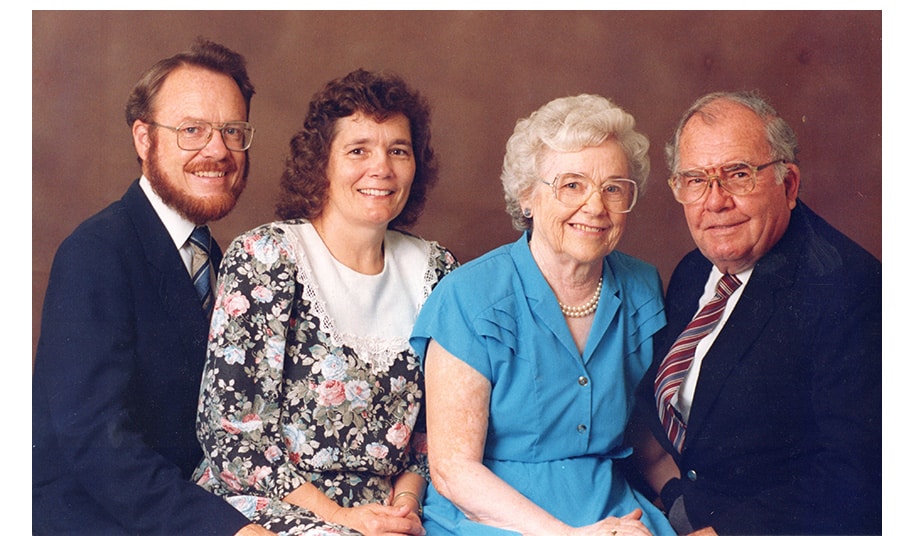
CHRISTIAN STANDARD: What are some of the main accomplishments/projects over the years?
DUANE STANLEY: Establishing the mission with the South African government at a time of unique rule during the apartheid era was a major accomplishment. That established church was then able to qualify under government rules for subsidies for ministers, the providing of educational training, and the ability to be granted land sites for churches in townships and locations where land ownership was totally at the discretion of local and tribal governments. These functions were vital to the revival of the work at a time when the churches, with the delay of the arrival of missionaries, had been ready to collapse completely. Subsequently, the greatest accomplishment has been the maturing of the church and its expanding growth.
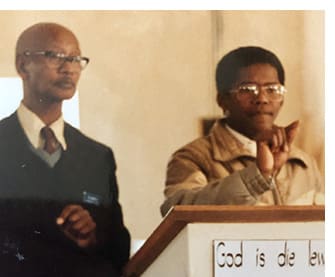
The Black work is well established. However, despite the efforts of many missionaries from the U.S., we do not have any flourishing churches among the White communities. While the legalities of separate races have broken down, communities are still divided by race. The purpose of the training program for ministers was designed to establish an indigenous leadership.
Beginning as far back as 1955, Nic Qwemesha, who later became the first national superintendent of the conference of churches, began teaching in the ministers training schools, in addition to serving as interpreter for missionary instructors. The use of nationals grew during the 1980s and ’90s, culminating in an African leader Louw Koopman being chosen as principal in 1994. The Africans increasingly led their own groups at conferences and at national ministers’ meetings in providing ongoing training and inspiration and challenges. In the early 2000s the conference took over full responsibility for leadership training, with the few remaining missionaries serving on advisory and governing boards and teaching intensive classes.
CHRISTIAN STANDARD: Where does the work stand now that there are no missionaries working directly with them?
DUANE STANLEY: There are very capable church leaders among the Africans, but they feel overwhelmed with lack of resources and limited time. Most ministers have secular jobs in addition to their ministerial roles. The current president of the conference, John Mpompo—who after training at UBI, went on for teachers training, began as a teacher, rose to principal, and ultimately to a role as an inspector of schools—is a typical example. The leaders fear sending potential ministers to evangelical training schools in South Africa for fear of doctrinal dilution but also fear of losing those potential ministers to other denominations whose systems have more to offer by way of salaries and security of positions. At the personal level, the yearning for recognition, status, and financial reward are major temptations that can upend lives of well-intentioned leaders.
Whether a nationally led ministerial training program paired with international short-term mission efforts of encouragement and training can be established is an open question. But there are capable leaders of integrity whom we must entrust to the Holy Spirit’s workings, for it is the Lord’s church and he has protected it and led it in many ways all over the globe for 2,000 years. It is into his hands that we commend the work in South Africa as the churches begin their second century.
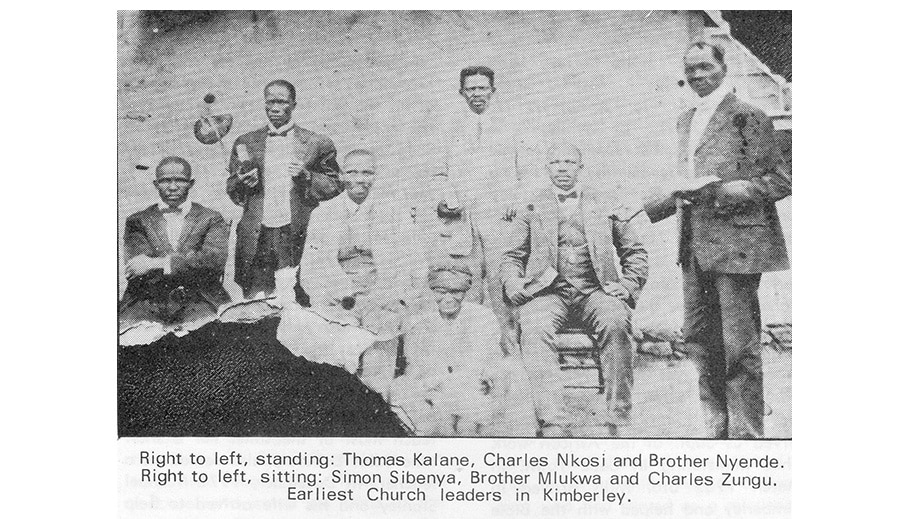
TIMELINE
1920—Thomas Kalane returned to South Africa after studying in the U.S., firmly establishing the first congregation in 1922.
1920s-’30s—Payne and Titus, missionaries from the U.S., served the ministry since the government required “White oversight.”
1950s—Long-term missionaries Max Ward Randall and family arrived in South Africa (1950). The Lynn Stanley (1953), Alvin Nicholson (1953), Bob Mills (1955), and John Kernan (1958) families arrived after them. They lay a firm foundation for the churches, before handing off the baton of leadership back to the nationals.
1960—An additional dozen missionaries arrived over time with a focus on the Black population.
1971—Michael and Caryl Stanley began working with the mission. The Stanleys have partnered with the African churches for 70 of their 100 years.
1989—Michael Stanley became principal of UBI and served until 1993.
1994—Umzumbe Bible Institute closed. The South African Bible Institute (SABI) opened in 1997 under the leadership of missionary Steve Caulley, until his retirement in 2019.
1998–2009—Michael and Caryl Stanley ministered in the eastern part of the country, KwaZulu Natal, and developed outreach programs in the community. These continue through 2022.
2022—Gala Centennial Celebration of the ministry and the retirement of Michael and Caryl Stanley. These are the last of the traditional, lifelong missionaries to work with the African churches through South African Church of Christ Mission.
Laura McKillip Wood, former missionary to Ukraine, lives in Papillion, Nebraska, and writes about missions for Christian Standard.
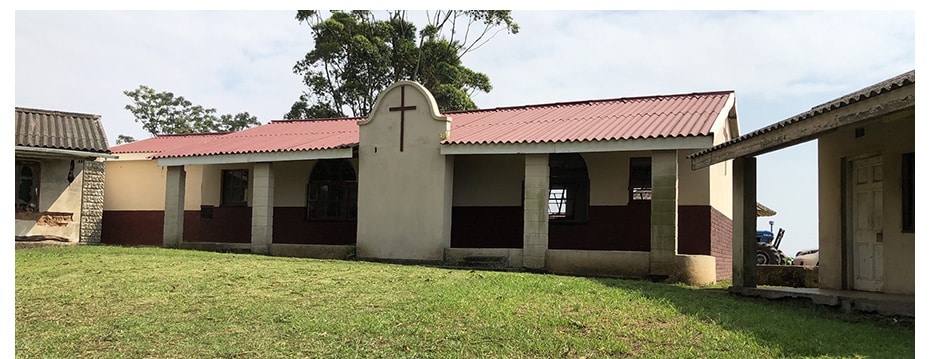


Hi
I stay in Johannesburg, Katlehong
Is there perhaps a branch that side